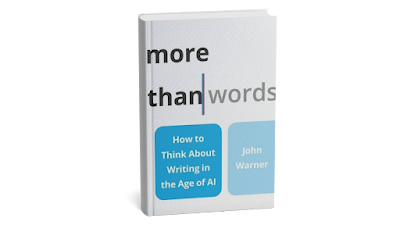"More Than Words: How to Think about Writing in the Age of AI" by John Warner
In "More Than Words: How to Think about Writing in the Age of AI," John Warner explores the evolving landscape of writing in the context of artificial intelligence. As AI technologies become increasingly integrated into our daily lives, the way we approach writing, creativity, and communication is undergoing significant transformation. Warner's book serves as a guide for writers, educators, and anyone interested in understanding how to navigate this new terrain. This summary delves into the key themes and insights presented in the book, highlighting Warner's arguments and the implications for writers in the age of AI.
The Intersection of Writing and AI
Warner begins by addressing the fundamental question: what does it mean to write in an age dominated by AI? He argues that while AI can generate text and assist in various writing tasks, it lacks the human touch that is essential to authentic writing. The author emphasizes that writing is not merely about producing words; it is an act of communication that involves emotion, intention, and context. Warner asserts that the unique human experience and perspective cannot be replicated by machines, making the role of the writer more important than ever.
The Role of Creativity
One of the central themes of the book is the importance of creativity in writing. Warner discusses how AI can assist in the writing process by providing suggestions, generating ideas, and even proofreading. However, he warns against over-reliance on these technologies, as they can stifle creativity and originality. Warner encourages writers to embrace their creative instincts and to view AI as a tool that can enhance their writing rather than replace it. He advocates for a balanced approach, where writers harness the power of AI while maintaining their unique voice and perspective.
The Changing Landscape of Education
Warner also addresses the implications of AI for writing education. He argues that traditional writing instruction must evolve to incorporate the realities of AI technology. Educators are challenged to teach students not only how to write effectively but also how to think critically about the role of AI in their writing processes. Warner suggests that writing programs should focus on developing students' creativity, critical thinking, and ethical considerations when using AI tools. He emphasizes the need for a curriculum that prepares students for a future where AI is an integral part of the writing landscape.
Ethical Considerations
As AI continues to advance, ethical considerations surrounding its use in writing become increasingly important. Warner raises questions about authorship, plagiarism, and the authenticity of AI-generated content. He argues that writers must be aware of the ethical implications of using AI tools and should strive to maintain integrity in their work. Warner encourages writers to engage in discussions about the ethical use of AI in writing and to advocate for transparency in how AI-generated content is produced and used.
The Future of Writing
In the latter part of the book, Warner speculates on the future of writing in an AI-driven world. He envisions a landscape where human writers and AI coexist, each contributing to the writing process in unique ways. Warner believes that the demand for authentic, human-centered writing will only increase as readers seek meaningful connections with the content they consume. He argues that writers who embrace their humanity and leverage AI as a supportive tool will thrive in this new environment.
Practical Strategies for Writers
To help writers navigate the challenges and opportunities presented by AI, Warner provides practical strategies throughout the book. He encourages writers to experiment with AI tools, to use them as brainstorming partners, and to engage in collaborative writing processes. Warner also emphasizes the importance of developing a strong personal voice and style, as these elements will set writers apart in a world where AI-generated content is ubiquitous.
Embracing the Future of Writing
In conclusion, "More Than Words: How to Think about Writing in the Age of AI" is a thought-provoking exploration of the intersection between writing and artificial intelligence. John Warner challenges readers to rethink their approach to writing in a world where AI is increasingly present. He advocates for a balanced relationship between human creativity and AI assistance, emphasizing the importance of maintaining authenticity and ethical considerations in writing.
As we move forward into an era where AI will play a significant role in the writing process, Warner's insights serve as a valuable resource for writers, educators, and anyone interested in the future of communication. By embracing the unique qualities that make us human and leveraging the capabilities of AI, we can navigate this new landscape with confidence and creativity.
.png)






